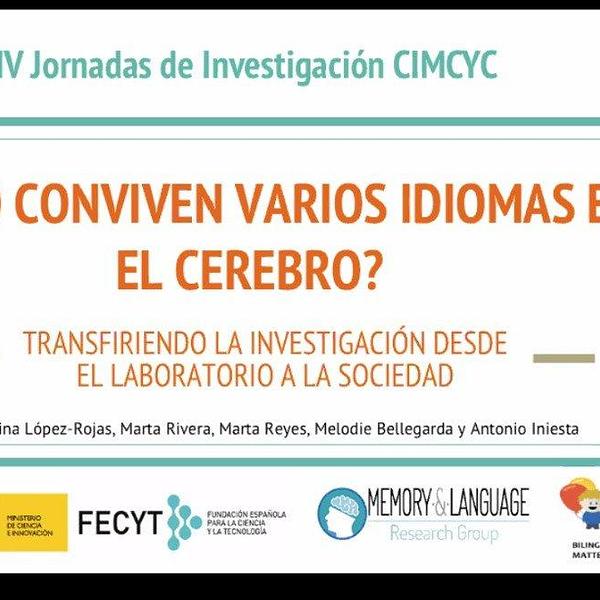
2021-05-28
Cristina López-Rojas participated in the “blitz talks” sessions puts the spotlight our Bilingualism Matters objectives
Last Thursday, May 20th the 4th annual CIMCYC Research Conference took place, an event focused on the perspective of gender in psychology research. Our colleague Cristina López-Rojas participated in the “blitz talks” sessions and presented about the different lines of research focused on bilingualism within the Memory and Language Group. In addition, she took advantage of the moment to spotlight our FECYT project “How do languages co-exist in the brain? Relaying evidence from the laboratory to our society” (FCT-19-15358). The main objective of this project is to bring the research carried out in our laboratories to the general population.
In our research group we have several lines of research on bilingualism ranging from exploring how certain processes of memory, writing or metamemory are related to bilingualism, to exploring how language learning may be modulated by individual differences or by elements such as music. In addition to these general objectives, we also investigate how certain related factors may modulate outcomes. For example, we look at whether the age of second language acquisition produces different effects on the processes we study. To do this, we conduct behavioral studies as well as studies using eye-tracker or EEG techniques. These techniques allow us to discover how the bilingual brain works and, therefore, how several languages coexist in the same brain, which is the title of our dissemination project.
This project is the main focus of our branch of Bilingualism Matters at the moment. Our organization aims to raise awareness about the social, cognitive and linguistic benefits of bilingualism and second language learning. Some members of the Memory and Language Group, together with the ANACOR Linguistics Group at the University of Granada, form the Granada branch. As a result, this outreach project arose with the general objective of disseminating scientific advances related to bilingualism and language learning to all social groups that are directly involved in bilingualism in their daily lives. Therefore, our activities are aimed at bilingual schools, parents who practice bilingual parenting, people interested in learning languages or professionals in bilingual education. To this end, we create activities that encourage the participation of these groups through conferences, congresses, workshops, lectures, etc. A general objective throughout all these activities is to promote the role of women in science by encouraging their participation in our activities and showing examples of research carried out by female scientists. It is important to highlight that more than half of the team members of BM UGR are women and, thanks to this, the visibility of women in science is evident from the beginning in any of the activities we develop. Women do science, we are researchers, and we can be experts in a field and disseminate our findings.
